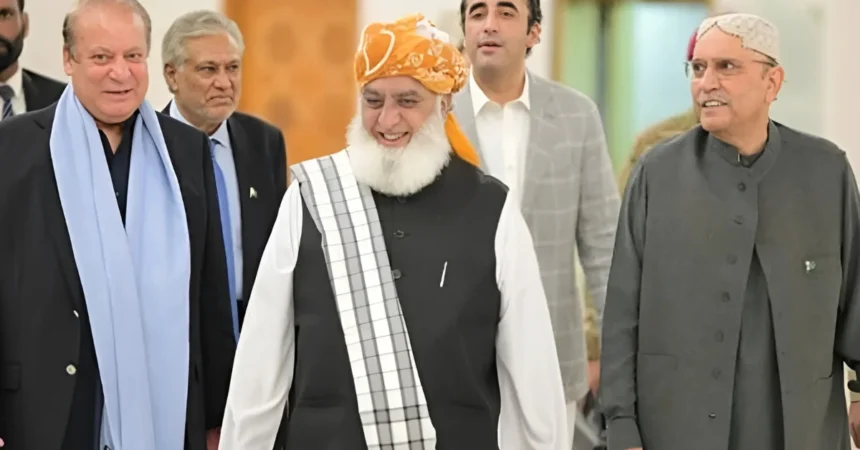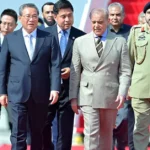In the dynamic political landscape of Pakistan, the prospect of constitutional amendments is gaining momentum as mainstream leaders inch closer to reaching a national consensus. The discussions surrounding these amendments are crucial, aiming to address longstanding issues within the political framework and ensure a more effective governance structure. As various political factions come together, the implications of these amendments could reshape the future of Pakistan’s governance and democratic processes.
- Understanding Constitutional Amendments
- Historical Context of Constitutional Amendments
- Mechanisms for Amendment
- Recent Trends and Discussions
- Implications of Proposed Amendments
- Community Reactions and Public Sentiment
- The Future of Constitutional Amendments
- The Current Political Landscape
- Key Areas of Focus for Amendments
- Reactions from Political Leaders
- The Role of Civil Society
- The Path Forward
Understanding Constitutional Amendments
Constitutional amendments are vital tools that allow for the adaptation and evolution of a nation’s legal framework to meet contemporary needs. In Pakistan, amendments have historically been instrumental in addressing critical issues, ranging from governance structures to electoral processes. The constitution provides mechanisms for amendments, which can either be proposed by the Parliament or initiated through public demand.
Recent discussions among political leaders reflect a growing recognition of the need for reform. The aim is to create a more inclusive and effective political system that can respond to the aspirations of the Pakistani people.
Historical Context of Constitutional Amendments
Throughout Pakistan’s history, constitutional amendments have played a pivotal role in shaping the country’s political landscape. The original constitution of 1956 was the first step towards establishing a legal framework, but it was frequently amended in response to political instability and changing leadership. Subsequent constitutions have also faced similar challenges, leading to numerous amendments that reflect the evolving needs of the society. Key amendments have addressed issues such as the balance of power between federal and provincial governments and the electoral process, making them a crucial aspect of the country’s governance.
Mechanisms for Amendment
The Constitution of Pakistan provides specific mechanisms for amendments, which can occur through various channels. Amendments can be proposed by either the Parliament or through public demand, allowing for flexibility in the legislative process. The process typically requires a two-thirds majority in both houses of Parliament, ensuring that proposed changes have broad support. This mechanism aims to prevent hasty or arbitrary amendments, safeguarding the integrity of the constitution while allowing for necessary reforms.
Recent Trends and Discussions
In recent years, there has been an increased focus on the need for comprehensive constitutional reforms. Political leaders have initiated discussions regarding amendments aimed at enhancing democratic processes, addressing governance issues, and improving the accountability of public officials. The growing recognition of the need for reform is driven by various factors, including public dissatisfaction with the political status quo and the desire for greater transparency in governance. As a result, leaders from different parties are engaging in dialogue, exploring potential areas for consensus on necessary reforms.
Implications of Proposed Amendments
The implications of proposed constitutional amendments can be far-reaching. If successfully implemented, these amendments could lead to a more transparent and accountable government, strengthening the democratic fabric of the nation. Moreover, reforms addressing electoral processes could enhance the fairness of elections, reducing the likelihood of manipulation and fostering public trust in political institutions. Additionally, empowering local governments through decentralization could improve governance and ensure that citizens’ voices are heard in decision-making processes.
Community Reactions and Public Sentiment
The public’s response to discussions about constitutional amendments is critical to their success. Citizens are increasingly vocal about their demands for transparency, accountability, and inclusive governance. Community reactions vary, with some expressing optimism about the potential for positive change, while others remain skeptical about politicians’ intentions. Engaging the public in the reform process is essential, as it fosters a sense of ownership and ensures that the amendments reflect the needs and aspirations of the populace. Civil society organizations play a vital role in this regard, advocating for inclusive dialogue and monitoring the amendment process to hold leaders accountable.
The Future of Constitutional Amendments
Looking ahead, the future of constitutional amendments in Pakistan hinges on the ability of political leaders to build consensus and foster collaboration. Establishing trust among diverse political factions is essential for navigating the complexities of the amendment process. As discussions continue, it is imperative for leaders to focus on creating clear and actionable proposals that resonate with the public. Engaging citizens through consultations and town hall meetings will enhance the legitimacy of the proposed changes and ensure that the amendments serve the interests of all Pakistanis.
The Current Political Landscape
The political climate in Pakistan has been marked by division and unrest in recent years. Various political parties, each with their agendas and constituencies, have often struggled to find common ground. However, recent developments indicate a shift towards collaboration among mainstream leaders, highlighting the importance of unity in addressing national challenges.
- Increased Collaboration: Political leaders from different parties are engaging in dialogues, seeking common ground on critical issues. This collaboration is essential for fostering stability and consensus on constitutional amendments.
- Challenges to Unity: Despite the positive momentum, divisions still exist. Some political factions remain skeptical of the intentions behind the proposed amendments, fearing that they may undermine their political interests.
- Public Sentiment: The Pakistani populace is increasingly demanding accountability and transparency from their leaders. This pressure is driving politicians to consider reforms that resonate with public expectations.
Key Areas of Focus for Amendments
As discussions progress, several key areas have emerged as focal points for potential constitutional amendments:
- Electoral Reforms: Ensuring free and fair elections is paramount for strengthening democracy in Pakistan. Proposed amendments may address issues such as the electoral process, campaign financing, and the role of the Election Commission.
- Decentralization of Power: Empowering local governments can enhance governance and accountability. Amendments may focus on decentralizing authority, allowing for greater local representation and decision-making.
- Judicial Independence: Strengthening the independence of the judiciary is essential for upholding the rule of law. Proposed reforms may aim to enhance the appointment process of judges and ensure judicial accountability.
- Protection of Fundamental Rights: Ensuring that the constitution guarantees the protection of fundamental rights is critical. Amendments may address issues related to freedom of speech, assembly, and the rights of marginalized communities.
Reactions from Political Leaders
The movement towards a national consensus on constitutional amendments has garnered a range of reactions from political leaders across the spectrum:
- Positive Responses: Many leaders have expressed optimism about the potential for consensus. They believe that collaborative efforts can pave the way for meaningful reforms that benefit the nation as a whole. A prominent leader stated, “We must put aside our differences and work towards a common goal for the betterment of our country.”
- Skepticism and Criticism: However, some leaders remain cautious, raising concerns about the true intentions behind the proposed amendments. They argue that certain factions may seek to exploit the process for political gain, undermining the democratic spirit.
- Public Expectations: Political leaders are acutely aware of the public’s expectations for accountability and transparency. As discussions unfold, they recognize the need to align their proposals with the aspirations of the electorate.
The Role of Civil Society
Civil society organizations play a crucial role in advocating for democratic reforms and holding political leaders accountable. Their involvement in discussions surrounding constitutional amendments can enhance transparency and ensure that the voices of marginalized communities are heard.
- Advocacy for Inclusivity: Civil society organizations emphasize the importance of including diverse perspectives in the amendment process. They advocate for reforms that address the needs of all citizens, particularly marginalized groups.
- Monitoring and Accountability: Civil society plays a vital role in monitoring the implementation of proposed amendments. Their oversight can help ensure that reforms are not merely symbolic but lead to tangible improvements in governance.
The Path Forward
As mainstream leaders work towards a national consensus on constitutional amendments, several critical factors will shape the process:
- Building Trust Among Political Factions: Establishing trust among diverse political groups is essential for achieving consensus. Leaders must engage in open dialogues, addressing concerns and finding common ground.
- Public Engagement: Involving the public in discussions about constitutional amendments can enhance legitimacy. Town hall meetings, public consultations, and awareness campaigns can facilitate informed dialogue.
- Drafting Clear Proposals: Clear and comprehensive proposals are necessary to avoid ambiguity in the amendment process. Political leaders should collaborate with legal experts to draft amendments that are both practical and impactful.
- Legislative Process: Once a consensus is reached, the proposed amendments must navigate the legislative process. This requires securing the support of a majority in Parliament to ensure successful passage.
The movement towards a national consensus on constitutional amendments in Pakistan represents a pivotal moment in the country’s political history. As mainstream leaders engage in dialogues to address pressing issues, the potential for meaningful reforms emerges. By focusing on electoral reforms, decentralization, judicial independence, and the protection of fundamental rights, these amendments can reshape the future of governance in Pakistan.
While challenges remain, the commitment to collaboration among political leaders and the involvement of civil society can pave the way for a more inclusive and effective political system. The success of this initiative will depend on the ability of leaders to transcend political divides and prioritize the aspirations of the Pakistani people.
#PakistanPolitics #ConstitutionalAmendments #NationalConsensus #PoliticalLeadership #ElectoralReforms #JudicialIndependence #CivilSociety #PublicEngagement







